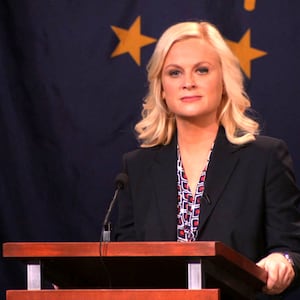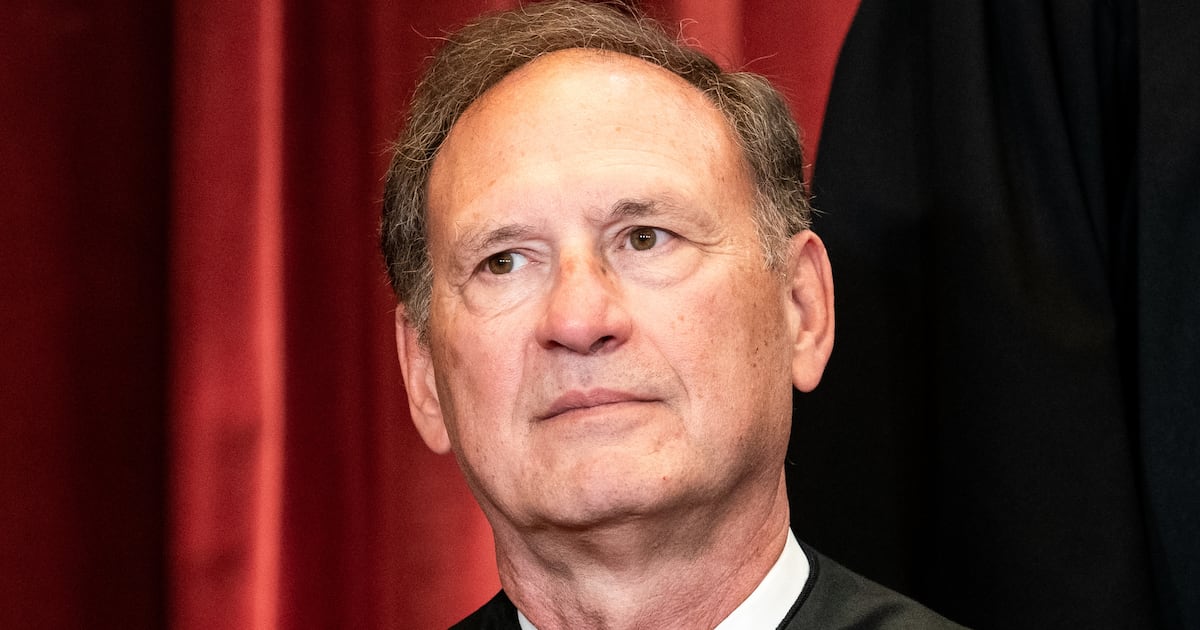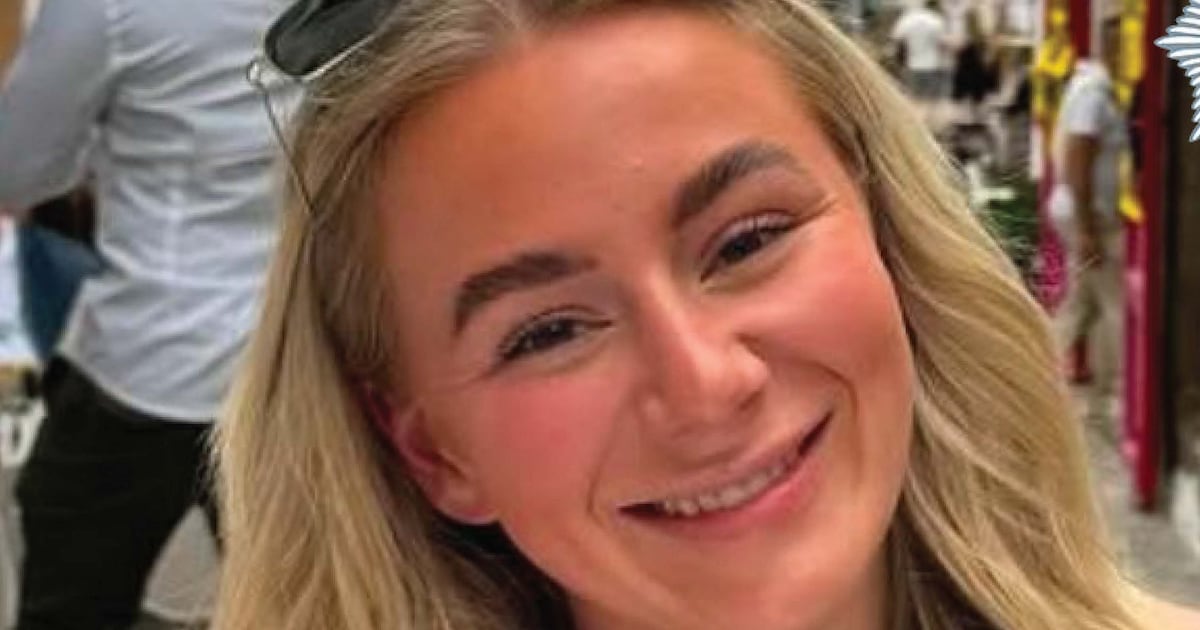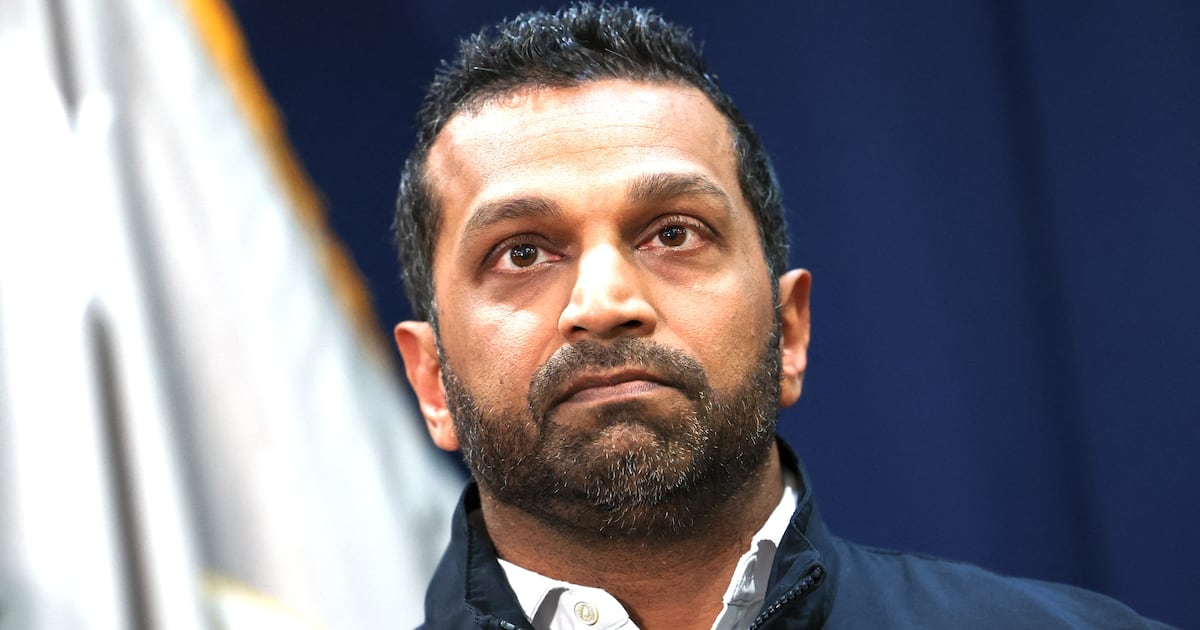The Good Place creator Mike Schur and his team of writers think a lot about how to live a good life: what we owe to one another, why our decisions matter, how to be selfless or kind. Season three of the sci-fi-inflected fantastical sitcom—line for line, among the sharpest on television—reinvented itself yet again to acknowledge the pitfalls inherent in trying. Bettering oneself is daily, soul-crushing work, it turns out, with no guarantee of eternal reward. Or, if you’re named Doug Forcett, the idea of that reward is its own special torture.
The Calgary-residing Good Place all-timer, the man who’s come closest to guessing what the afterlife really looks like (his mushroom-induced vision was “92 percent correct,” according to Michael) lives like a wretch in service to the points system. He lets a neighborhood teen bully him, “as long as it makes him happy.” He drinks his own re-processed urine to cut down on waste. Where Eleanor (Kristen Bell), Tahani (Jameela Jamil), Jason (Manny Jacinto), and Chidi (William Jackson Harper) now understand that they are doomed and aim to help others get into the Good Place instead, Doug’s masochistic existence on Earth is already hell.
“Don’t Let the Good Life Pass You By”—the title of Thursday’s episode, and solid advice for poor Doug—highlights more clearly than ever how broken the afterlife’s points system is, and sets up what Schur calls an exciting “next phase” of the show. The prolific writer and producer behind some of TV’s warmest, most re-watchable broadcast sitcoms (Parks and Recreation, Brooklyn Nine-Nine, and The Office) broke down the events of Season 3 so far, hinted at what’s to come as the group dies (again) and departs Earth, and thoughtfully weighed the implications of working with a friend, Parks and Rec star Aziz Ansari, in a conversation with The Daily Beast.
Now, into Janet’s void!
In the episode before last night’s, Eleanor argues for determinism—that we don’t really have free will, that everything is out of our control, and therefore nothing matters. This is in response to seeing herself say “I love you” to Chidi in a past reboot, but it also rings true as a coping mechanism for 2018—“lol nothing matters” is almost its own cliché response to the times we’re living through.
I would say it’s less influenced by—well, actually that’s not true. I was going to say it’s less influenced by current events than maybe it appears, although, part of the reason that we did that episode was because I personally find—and I don't want to speak for all the writers, but I’ll speak for at least some of them—I find that argument very reductive and boring and kind of stupid. The argument that is appealing to me is the one that Michael gives, which is, well, what’s the point of arguing that, right? Either things are determined or they’re not, but you’re still living your life, you’re moving about the Earth and you have responsibilities to people that you care about and who care about you, and you have actions that you can either take or not take. Saying “oh, what’s the point, it’s all predetermined” is just a selfish way of saying, “I get to do whatever I want and no one can complain or say that I’m doing a bad job of living.” And I just find that really reductive.
And so we put it into the context of Eleanor being a little bit shaken up by seeing herself be vulnerable, which she doesn’t like, and freaking out about the emotional journey that she didn’t even know she’s on. It seems like a place that you might retreat for emotional safety, right? If you’re really freaked out about something, it’s a pretty safe little retreat to go like, “Well, it doesn’t even matter, ‘cause nothing matters, ‘cause everything’s predetermined.” (Laughs) You know? So we were telling it in the context of an emotional escape for her but in general it’s also an argument: “lol nothing matters” is a funny thing to put on Twitter when the president does something insane but I don’t think it’s actually a good way to live. And I want to advocate for a different way of approaching problems, I guess.
Right, even if mega-demons control Michael, and those mega-demons are controlled by super-intelligent tarantula-squids, on a micro enough level, everything matters.
Of course, when she’s like, “Well maybe there’s a mega demon who’s controlling you,” it’s like, well even if that is true, so what? You’re still in a certain place in front of a certain person with a certain decision to make. And whether the mega demon or the giant octopus or the giant alien-tentacle-squid or whatever has made you do it, you still need to do it. You still need to try doing the right thing as much as you can.
Eleanor also has a bleak but fairly accurate description in an earlier episode of the way American individualism has festered to such an extreme that it’s nearly broken society: “You only look out for number one, scream at whoever disagrees with you, there are no bees because they all died, and if you need surgery you just beg for money on the internet.”
(Laughs) Yeah. Megan Amram wrote that line. Eleanor does this thing—and this is just the result of being written by smart people like Megan Amram—but she can oscillate between extreme optimism and hope and extreme pessimism and misery. She’s the one who rallies the troops after they figured out that they were all doomed and was like, we still gotta try, guys. At the end of that episode, she comes back and is like, it’s better than not trying, right? Let’s try. But also in that moment, when her life has been revealed to be a pointless doomsday operation, she hits a very low point. And at anyone’s lowest point, one is capable of [thinking], “Oh, this is terrible.” (Laughs) Like, if you just look around, it’s like, this is a terrible system. The negatives so outweigh the positives in modern society, even in the wealthiest country in the world. There’s so much pain and suffering and unhappiness.
And so that was her sort of indulging in it, I think, and saying, every man for himself, every woman for herself, who cares, nothing matters, this all sucks, it’s all pointless, goodbye, give me a free drink for my birthday, even though it’s not really my birthday. We just wanted to show what happens when a person can really hit rock bottom in thinking there’s no point to any kind of positive action in the universe. But I would like to believe that by now, after what she’s been though, that she’s more the person who shows up at the end of that episode and says, “let’s just try and see what happens,” than the person who demanded a free drink when it isn’t even her birthday.
One fundamental difference this season is that the group has been working to get other people into the Good Place rather than themselves, since they already know that they’re doomed. I would argue that that kind of selflessness is the ultimate Good Place-worthy move? Like if that doesn’t get them into heaven, what else would?
Yeah, right, selflessness at some level. The show has been arguing subtly for a while that a huge part of the calculation has to do with how you treat other people. So that is, ideally, that is how you should spend most of your time—at least thinking about other people, at least considering how your actions affect other people. It’s a drum that the writers have been beating for a while now, which is if you really want to calculate how good or bad your decision is, you kind of have to start with how it affects the people around you.
And that’s the essence of the book What We Owe to Each Other, which is a little bit of a spiritual guide for us. That book argues that if you were setting up a society, the best way to set up the society would be to suggest rules that any reasonable person in your little group could veto if they felt it were unfair. That is tantamount to saying that you can only do things that aren’t unfair to other people. Right? (Laughs) That’s the essence, I think, of what it means to do something good. Yeah, that was the idea behind this little section of the show, is if they could spend all of their time or energy on helping other people, that ought to help them, too.
OK, now I need to talk about shirtless Chidi. The image calls back to season one, when Eleanor mentions that he’s “surprisingly jacked.” But were there actual discussions about what it would mean to reveal that this philosophy professor, perpetually crippled by indecision, also happens to have that body? Or was it just to be funny?
No, there were. Will Harper is an extremely good-looking man and he has an extremely muscular torso. And when we saw him without his shirt on, we immediately all came to the same conclusion: of all the insane things that this show has posited, the most insane one is that an academic would have a body that looks like that. (Laughs) That’s probably the least plausible thing we’ve ever done on the show, is like, a philosophy professor who looks like that. But at the same time, oh well! That was what the script called for, it made us laugh, also the universe got free shirtless Will Harper, which isn’t a bad thing. A little eye candy for people, that’s a time-honored form of American entertainment. So yeah, ultimately—I mean, that idea, that his shirt got soaked by a sprinkler and he just took it off and dropped it on the ground and then went grocery shopping shirtless, that just made us laugh. And it happens to be that Will does not have the frame that you would associate with a philosophy professor. But, oh well. (Laughs)
You did your own version of putting good out into the world with that scene.
That’s right! Yeah.
So at the end of Thursday night’s episode, “Don’t Let the Good Life Pass You By,” Janet offers to take everyone into her void. That’s exciting! But they all have to die again to get there. That’s… intriguing. She’s described the void before as a “barren, boundless nothingness” on another plane of existence. It’s not a place, exactly, but is it somehow embedded in the afterlife? Is that where all the stuff she produces comes from?
You, um, ahem, and the rest of the country and the rest of the world that watches the show are gonna learn a lot about the void, I would say. It’s a pretty exciting episode for us, the one that’s gonna end the year and I don’t want to give anything away. So I would say the less you know about episode ten, the better.
After the Doug Forcett fiasco, the show also seems primed to start chipping away at part of its own premise: the points system. It’s been convincing us for a while that the system is fundamentally flawed. And with Doug, we see how adhering to it flawlessly actively harms a person’s life.
Well, we haven't questioned it really aggressively just yet. It’s always kind of just been put forth like, this is the system, that’s the deal, what are you gonna do? It’s omniscient. But now they’ve spent four or five episodes on Earth with the explicit intention of trying to help other people get in. They’re basically experimenting, running a test, and it was sort of a natural thing to think, alright, well they go around to Tahani’s sister and Eleanor’s mom and Jason’s friend and his dad, and they do things that they feel are good, that they’re helping. It’s like, hey! We’re doing it! We’re helping people move on the right path. And at some point, they’re gonna want to know how close they’re getting. So now comes the moment in episodes nine and ten when they get to actually see what effect they’re having on the people that they’ve been helping. And that’s going to kind of shift us into the next phase of the show.

The Good Place is one of few shows that explicitly asks how to live a good life, how to be kind to each other, what we owe to one another, even with all the messiness and difficulty of adult life. I’m gonna try to ask something in a real-world context now. I know you apologized last year for having Louis CK on Parks and Recreation even after you’d heard the rumors. It’s a very different, less black-and-white situation with Aziz Ansari. How do you handle each? Would you work with Aziz again?
Well, you know. (Laughs) The answer is yes, I would. And the tricky thing about all of this stuff is this kind of national reckoning that the entertainment industry has finally had with itself—or at least has begun to have, I would say—we’re far from actually having the complete, sort of thought process and emotional processing that is required. There was a lot of dust and a lot of that dust has now settled a little bit, and now it’s time for everybody to really think hard and reflect and change and grow and do all of that stuff that is required to heal. And I’m not talking about any one person or group of people. The initial revelation of how prevalent all of these things are is over. And now it’s phase two. Phase two is going to be equally tough and hard and it’s going to require a lot of emotional turmoil and thought processes and investigations and all that stuff. And I am happy that it’s happening. I’m excited for it to happen.
But I also think that now is the time when we can start getting specific and really honing in on, what are the behaviors that need to be immediately outlawed forever? What are the behaviors that are more prevalent than others? What are the differences and similarities between them? What are the patterns? We need to start really delving into this stuff in a real, intense way to make sure that we get to the bottom of all of it. And that’s gonna be more fruitful, I think, in the long run than phase one. Phase one was like, just an apocalypse of “holy shit, look at everything that’s been happening.” Now we get to start actually investigating, and that’s good, I think. That’s positive and that’s what should happen. But it also means that we have to get specific.
My personal feelings about all of these people are not really super relevant? (Laughs) At least, they’re way lower on the ladder of importance than a lot of other people’s feelings and thoughts about them. But it’s weird, this question brings us all the way back to the beginning. Because the important thing to me is that we all keep trying. Like, so much of this stuff happened in part because no one wanted to confront it or think about it or deal with it or raise their hand and say, this is happening and this is real. And that part of the problem and that sort of calcified system is over, which is good. Now we get to start saying, OK, now that we know about this, let’s talk about it. And the only thing you can do is to keep trying to sort through it and figure it out.
That’s what we all need to do in every one of these cases is keep talking about it, don’t ignore it, confront it, deal with it, cope with it, root it out where it needs to be rooted out. That’s the cure for this, ultimately, I think. The cure for any bad behavior, any systematic bad behavior, any calcified bad behavior, is to be like, sorry! We just gotta keep talking about it. I know it’s exhausting. But think about how exhausting it was for people when no one would talk about it. That’s how I feel about all of this stuff.







